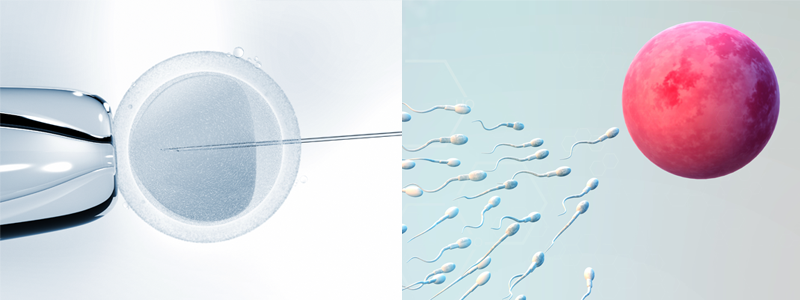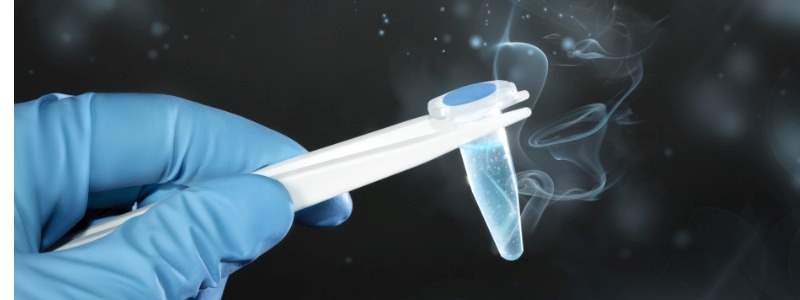IUI vs IVF
If you’re considering fertility treatment and are wondering whether IUI or IVF is the right choice for you, there are a few fundamental elements of each treatment it is important to know, so you can have a well-rounded idea of what to expect during the process. In this article, we explore both IUI (Intrauterine Insemination) and IVF (In Vitro Fertilisation) in terms of what they are, the process involved, effectiveness, and other important considerations.
What is IVF?
IVF is a fertility treatment that involves the fertilisation of an egg with sperm outside the body, in a lab. The fertilised embryo is then transferred to the uterus, where it can implant and develop into a pregnancy. This procedure is often recommended for those with fertility issues such as blocked fallopian tubes, low sperm count, or advanced maternal age.
Who is IVF suitable for?
- Couples with infertility: IVF can help couples who have been trying to conceive for a long time without success. It can assist in overcoming issues such as blocked fallopian tubes, low sperm count or quality, endometriosis, or unexplained infertility.
- Patients ovulation disorders: IVF can be used to treat individuals with irregular or absent ovulation, such as those with PCOS (polycystic ovary syndrome).
- Individuals with genetic disorders: IVF with PGT (preimplantation genetic testing) can be used to screen embryos for genetic disorders, allowing the selection of healthy embryos for implantation.
- Same-sex couples: IVF allows same-sex couples, to have biological children by using donor eggs, sperm, or embryos. Additionally a treatment we offer at CREATE is reciprocal IVF which involves implanting one partners egg into the other’s uterus.
- Single individuals: IVF enables single individuals to fulfil their desire for parenthood by using donor eggs or sperm.
- Individuals with fertility preservation needs: IVF can be used to freeze embryos, eggs, or sperm for future use, particularly for individuals undergoing medical treatments that may affect fertility, such as chemotherapy.
What is IUI?
IUI, or Intrauterine Insemination, is a fertility treatment that involves the direct placement of sperm into the uterus during ovulation. This procedure is commonly used for couples with unexplained infertility, mild male factor infertility, or cervical issues that may hinder sperm from reaching the egg naturally.
Who is IUI suitable for?
IUI can be beneficial for various individuals or couples. It may be recommended for:
- Couples with unexplained infertility: When the cause of infertility cannot be identified, IUI can be a first-line treatment option.
- Mild male factor infertility: If the male partner has a borderline low sperm count, sperm motility, or other mild sperm abnormalities, IUI can help increase the chances of pregnancy.
- Cervical factor infertility: In some cases, the cervix may produce mucus that is hostile to sperm, making it difficult for them to reach the uterus. IUI bypasses the cervix and places the sperm directly into the uterus, improving the chances of conception.
- Donor sperm: IUI is commonly used for individuals or couples who require donor sperm to achieve pregnancy.
- Vaginismus, erectile dysfunction and difficult sexual intercourse: IUI can be the first line of treatment when there are difficulties in achieving full penetrative sex due to male or female problems
- Unsuccessful ovulation induction: If a woman has been undergoing ovulation induction with medication but has not achieved pregnancy, IUI can be used to enhance the chances of success.
What is the Difference Between the IVF and IUI Process?
IUI Process
The IUI process begins with monitoring the patient's menstrual cycle to determine the optimal time for insemination. The patient may be prescribed medication to stimulate the production of eggs. The partner or sperm donor provides a semen sample, which has been washed and prepared in the lab. The prepared sperm is then inserted into the uterus using a thin catheter. The procedure is relatively quick and painless, and the patient can resume normal activities immediately after. The total IUI treatment takes roughly four weeks. In this four week period you will visit the clinic 2 to 3 times for monitoring . This allows for a clear view of cycle timing and tracking the development of eggs.
Mild IVF Process
At CREATE we specialise in mild IVF which involves several steps. First, the patient who will be providing the eggs for fertilisation undergoes mild ovarian stimulation to produce multiple eggs. These eggs are then retrieved through a minor surgical procedure. In the lab, the eggs are fertilised with sperm to create embryos. The embryos are monitored for a few days, and the healthiest ones are selected for transfer. The selected embryo is then transferred to the uterus, and any remaining embryos can be frozen for future use. This process differs from conventional IVF in significant ways, including the absence of down regulation. This means our treatment protocols do not interfere with the body’s natural menstrual cycle. Once eggs are judged to be mature, the patient will have an egg collection under sedation and later embryo transfer. The IVF process involves approximately 6-8 visits over 4 weeks to the clinic including egg collection and transfer day.
IUI vs IVF Success Rates
When comparing the success rates of IUI and IVF, it's important to consider various factors such as age, underlying fertility issues, and the number of treatment cycles. Generally, IVF has higher success rates compared to IUI, especially for couples with more complex fertility problems. However, IUI can still be a viable option for same sex couples with no underlying fertility issues or couples with minor fertility issues. The treatment may have lower costs if successful in the first or second round.
IUI vs IVF Prices
Generally, IUI is less expensive than IVF as it requires a less. However, it’s important to consider the overall costs, including multiple treatment cycles if needed. At Create we offer financing options to make fertility treatments more accessible and affordable. The cost of IUI and IVF can vary depending on factors such as location, clinic, and additional treatments required.
IUI vs IVF Baby Health
Both IUI and IVF can result in healthy pregnancies and the birth of healthy babies. At CREATE Fertility our mild IVF protocols work to prevent complications that can be caused by multiple births as we usually implant a single embryo each time. This protocol aligns with the UKs legal requirements and guidelines set by the HFEA.
So Which is Your Best Option?
During your initial consultation, one of our specialists will provide informed guidance on which treatment options would be most suitable to your needs. Choosing between IUI and IVF depends on various factors, including your specific fertility issues, age, financial considerations, and personal preferences. One of our fertility consultants will guide you through each option based on the results of your scan. A consultation with CREATE fertility will allow our specialists to evaluate your individual situation and provide personalised recommendations.
If you have any further questions our team can guide you through the process, discuss costs, success rates, and any concerns you may have. Remember, you are not alone in this journey, and our resources and experts are available to help you make the best decision for your fertility treatment.






